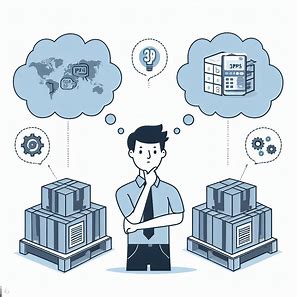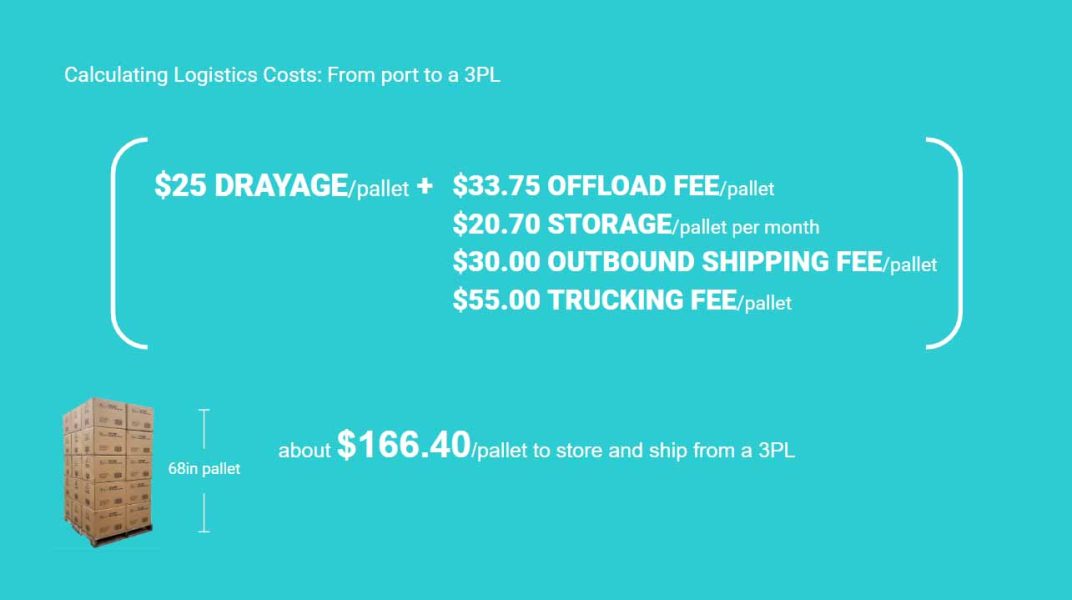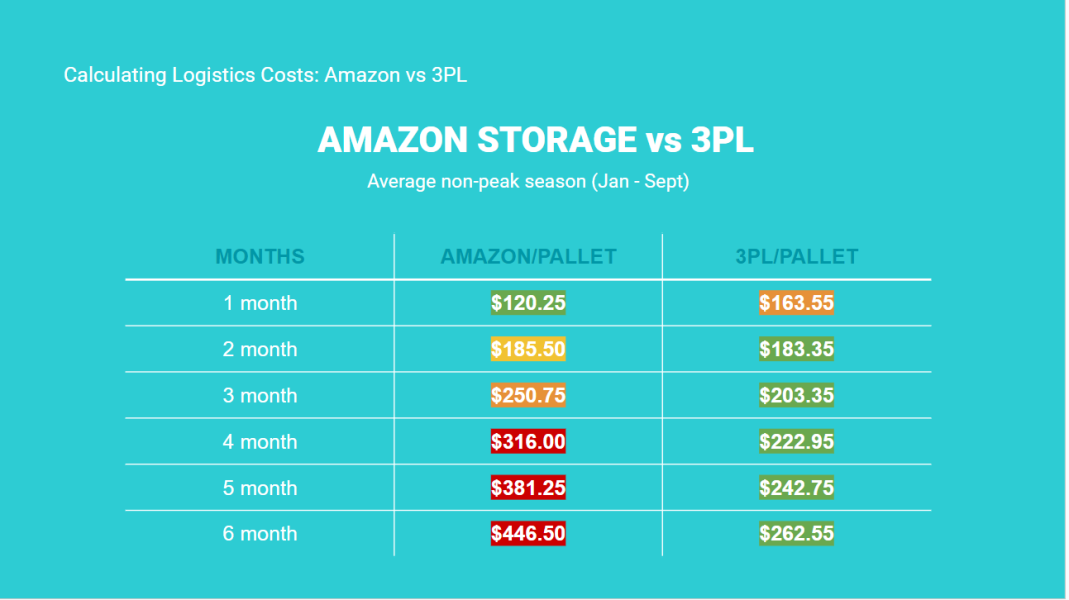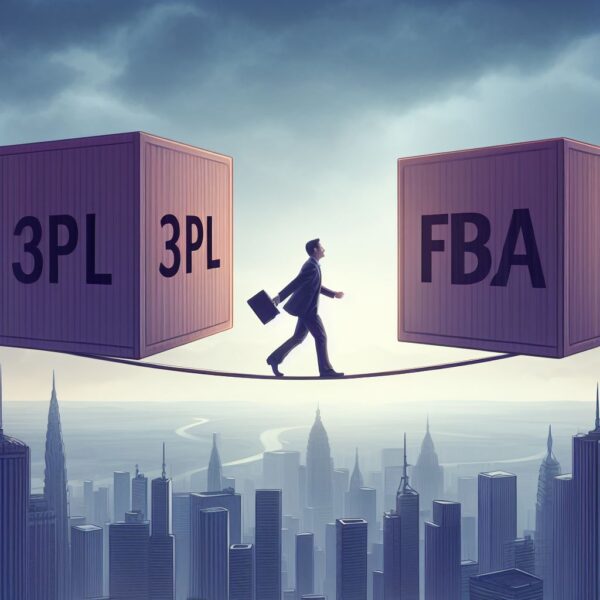The Basics of Amazon FBA
Amazon FBA is a fulfillment service offered by Amazon that lets sellers store their products in Amazon’s warehouses across the US. When a customer purchases the seller’s product on Amazon, Amazon will pick, pack, and ship the order out to the customer.
| Aspect | Amazon FBA | 3PL (Third-Party Logistics) |
|---|---|---|
| Overview | A service where Amazon handles storage, picking, packing, shipping, and returns for sellers. | Companies offering logistics services including transportation, warehousing, reverse logistics, and order fulfillment. |
| Seller Benefits | Access to Amazon’s expertise in storage, distribution, and customer service. | Customization and flexibility in logistics services, with potential control over branding and packaging. |
| The Buy Box | Being an FBA seller increases chances of getting this prime spot on Amazon product pages. | Not directly applicable, but effective logistics can indirectly impact product visibility and sales. |
| Customer Service and Returns | Handled by Amazon, including inquiries, returns processing, and ensuring customer satisfaction. | Typically managed by the seller or an external service, not by the 3PL providers, but here at Tactical Logistic Solutions we do it all in-house! |
| Nature of Services | Primarily focused on facilitating Amazon sales. | Broad range of services, often more tailored to individual business needs. |
| Using Both Services | Possible; FBA for Amazon sales and a 3PL for sales from other channels. | Often used in conjunction with FBA to diversify fulfillment strategies across different sales channels. |
| Choosing Between the Two | Based on business needs, sales channels, volume, growth plans, and the balance of costs and benefits. | Chosen based on specific logistical requirements, desire for customization, Amazon Channels, and non-Amazon sales channels. |
Table of Contents
Here is the quick answer to your question “What is the differences between a 3PL company and Amazon FBA“.
Key Features of Amazon FBA
Amazon FBA (Fulfillment by Amazon) is a comprehensive service that streamlines the entire process of selling products online. With FBA, sellers can store their inventory in Amazon’s fulfillment centers, where orders are picked, packed, and shipped to customers. This service allows sellers to focus on other aspects of their business while Amazon takes care of the logistics and fulfillment. Additionally, Amazon offers customer service and returns management on behalf of the seller, providing a hassle-free experience for both the seller and the customer.
Amazon provides sellers with an array of benefits through its extensive expertise in storage, distribution, and customer service. Through its advanced storage facilities, Amazon ensures that sellers’ products are safely and securely stored until they are ready to be shipped to their customers. Its efficient distribution network enables products to be delivered to customers quickly and reliably, while its exceptional customer service ensures that buyers receive the best possible shopping experience. By leveraging these specialized services, sellers can focus on growing their businesses while Amazon takes care of the logistical and customer service aspects of their operations.
What is a Third-Party Logistics 3PL?
A Third-Party Logistics (3PL) provider is a company that other businesses hire to manage different parts of their supply chain. This means they take care of things like keeping track of inventory, storing products in warehouses, packing orders, amazon fulfillment options, and shipping them out to customers. They also handle the process of returns if a customer sends something back.
3PL providers are really helpful for businesses that have a lot of products to sell or see sudden changes in how much they sell. For example, if a business launches a new product and it becomes really popular, a 3PL can help manage the increase in orders. As well as handling other crucial tasks such as seasonal inventory management.
One of the big advantages of using a 3PL provider is that they specialize in logistics, which means they’re experts in making sure products get from one place to another efficiently and safely. This allows the business hiring the 3PL to focus on other important things, like making their products or growing their brand, without worrying about the details of shipping and handling.
In short, a 3PL provider is like a partner for a business, taking care of all the complicated logistics so that the business can run more smoothly.
What is a 3PL: In the Amazon Context?
In the Amazon context, 3PLs provide customized solutions for businesses using the Amazon selling platform such as:
- Inventory Storage: Helps with storing inventory.
- Shipping: Manages the shipping process.
- Branding: Assists in branding your products.
- Outsourced Fulfillment: Acts as an outsourced fulfillment partner.
Why choose a 3PL warehouse?
Managing in-house warehouse operations can be taxing and takes time away from you being able to find more ways to make money with your product or even create a new one! Finding the right 3PL warehouse to help you manage your operations will relieve some of the headaches you might have. Hiring a third-party logistics company offers immense strategic and cost benefits. Here are a few of the many benefits.
- Advanced IT capabilities
- Flexibility and scaling of your product
- Improved Efficiency
- Global Expansion
The Pros and Cons of using Amazon FBA for your fulfillment needs
Pros of Using Amazon FBA
Amazon is a Goliath in the industry. Its business and business practices have become a staple for most of the modern world. Amazon offers options to help essentially use their spare resources for your business. Tapping into their market is easy and can bear high potential growth.
Prime Day and other Amazon boosts help play a role in the success of your Amazon product to help increase revenue.
Amazon Prime Eligibility & Global Reach
- Higher Sales: Items fulfilled by Amazon are eligible for Prime shipping, which drives higher sales.
- Market Access: Sellers gain easy access to Amazon’s global marketplaces like Canada, Mexico, and Europe, growing sales potential.
- High Traffic: Tap into Amazon’s vast existing customer traffic and brand trust, with access to Amazon’s customer base.
Streamlined Operations for Convenience and Time Savings
- Main Benefit: The main benefit of FBA is convenience. Amazon handles the storage, picking, packing, shipping, and customer service once items are sent to their warehouse.
- Efficiency: Amazon’s unified platform for inventory, order, and logistics management is efficient and reduces manual work.
Enhanced Customer Experience
- Quick Deliveries: Prime labeling combined with Amazon’s logistics results in quick deliveries.
Competitive Edge
- Visibility: FBA listing badges boost visibility in search results, and FBA sellers also get preferential treatment for winning the featured Buy Box spot on product pages.
Multichannel Fulfillment
- Single Inventory Pool: Leverage FBA’s fulfillment center network to handle orders from multiple platforms.
Cons of Using Amazon FBA
Much as being one of the most successful and profitable companies, working with a such goalith means you can be crushed by fees effortlessly without remorse. You may be in the big sea but that will also leave your brands open to piracy, undercutting your product. Below I’ve put together illuminating facts about using FBA for your business.
Higher Fees And Storage Costs
- Cost Analysis: Numerous fees make cost analysis challenging.
- Cost: Amazon charges fees that can add up to 10-15% of total sales.
- An important note: Not paying fee’s can exclude you from benefits and or get you booted from Amazons programs.
Looking for a way to drive down costs with Amazon 3PL? Here is a in-depth guide
Inventory Restrictions & Mixed Product Issues
- Limitations: Amazon sets limits on the amount of inventory allowed during peak periods.
- Quality Control: Inventory is blended with other sellers’ inventory, which can cause issues.
Return Handling
- Policy: Amazon controls the returns process which may not align with seller preferences.
High Competition
- Market Saturation: FBA lowers entry barriers, resulting in high seller competition.
- Copy Cat products: People can and may steal your ideas.
- Amazon is your competition: Remember Amazon has their own products that they sells, ships, and markets on their own platform.
Dependence on Amazon
- Policy Risks: You must adhere to Amazon’s evolving seller policies and risk account suspension.
- Compliance: Strict requirements can lead to delays or refusal of inbound shipments.
Limited Customer Interaction
- Limited Communication: No dedicated account managers to help you out on making the right decision for your brand. We all know how challenging things can be when we cannot directly speak with a representative.
- Engagement: Amazon controls the entire buyer experience, making it difficult to build loyalty.
The Pros and Cons of Using a 3PL Company for E-commerce Shipping
Pros of Using a 3PL Company
Utilizing a Third-Party Logistics (3PL) company offers several significant advantages for businesses. Firstly, it allows for expert handling of logistics, ensuring efficient inventory management, accurate order fulfillment, and timely shipping. This expertise often leads to cost savings, as 3PLs can leverage their scale and efficiency to reduce shipping and storage costs.
Additionally, partnering with a 3PL provides flexibility and scalability, enabling businesses to easily adjust to seasonal demands or market growth without the need for investing in additional infrastructure or personnel. Furthermore, 3PLs often have advanced technology for inventory tracking and logistics management, offering businesses valuable insights into their supply chain. By outsourcing logistics to a 3PL, businesses can focus more on their core competencies, such as product development and customer service, while relying on the 3PL’s expertise to enhance overall operational efficiency and customer satisfaction.
In-House Warehousing and Fulfillment Centers
A good Third-Party Logistics (3PL) company will have plenty of room in their warehouses to store your products. They also use inventory management and technology tools to help you track your product inventory daily. Although you’ll need to pay for the storage space, you can spread your products across different warehouses nationwide. This can help you save a ton of money on shipping costs in the long run.
Storage Rates and Shipping Cost Reduction.
Outsourcing to a Third-Party Logistics (3PL) provider comes with the advantage of their ability to select from various shipping carriers to secure the most cost-effective rates. Typically, a 3PL can access lower shipping prices than you might get individually, thanks to the large quantity of items they ship (including but not limited to your products) and their established connections with these carriers. Surprisingly to many, even storage costs tend to be more budget-friendly with a 3PL. This is because you’re essentially renting space in an already operational warehouse, which is usually more economical than managing and maintaining your own storage facility.
- Discounted Rates: 3PLs secure discounted shipping rates and optimize inventory and labor costs.
- Seasonal Spikes: You can rapidly scale 3PL services up or down.
Here are some examples of how much you can save here at Tactical Logistic Solutions
Here is a comparison between the cost of storage between 3PL Companies like us at Tactical Logistics compared to Amazon’s fulfillment and storage options.
Expertise and Experience
- Logistics Specialists: Staff are experienced in the latest technologies and complex regulations.
Resource Allocation
- Focus: With 3PLs managing logistics, internal resources can focus on customer-centric tasks.
- Dedicated Personnel: Get access to specialized in-house teams without the investment.
- Personalized Attention For Your Product: 3PL Companies with a dedicated team can quickly resolve any issues that might come up.
Global Reach
- Worldwide Network: 3PLs have an established network of carrier relationships and warehouses.
Continuous Improvement
- Optimization: 3PLs track logistics KPIs for process enhancements.
Customer Satisfaction
- Quick Fulfillment: Quick and accurate fulfillment of orders enhances customer satisfaction.
Cons of Using a 3PL Company
Starting Fees
Starting with a Third-Party Logistics (3PL) provider involves some initial expenses. Typically, you’ll encounter the following charges, which could be billed monthly or based on each stock-keeping unit (SKU), depending on the policies of your chosen 3PL. Although this being said, after the 2nd month of using a 3PL company to meet all of your product needs you are in the green.
- Initial Setup: This one-time charge by the 3PL often covers integrating their software with yours, tours of their warehouse facilities, and any necessary training.
- Receiving Fees: 3PLs usually charge for each shipment they receive at their warehouse. This could involve an hourly rate for unloading the shipment, counting inventory, and adding products into their inventory management system. Alternatively, it might be a fixed fee for each delivery, or a set charge per SKU.
- Storage Costs: Storage fees are generally based on the amount of space your inventory occupies in their fulfillment center, often calculated per square foot or by the pallet.
- Fulfillment Charges: These fees encompass the selection of items, packaging, label creation, inclusion of any package inserts, customizing packaging (if required), and processing orders. The cost varies based on the extent of these services needed for your products.
- Shipping Expenses: Typically, you’ll benefit from reduced shipping rates through a 3PL compared to standard carrier rates. This discount is due to the 3PL’s larger scale of operations and order volume, and their negotiated deals with specific shipping companies.
Loss of Control
- Oversight: Day-to-day logistics operations are managed entirely by the 3PL.
Communication Challenges
- Expectations: Misaligned expectations can result in costly errors.
Integration Issues
- IT Complexity: Complex IT integrations are required between systems.
Standardization Challenges
- Reputation: Any 3PL missteps can negatively impact brand reputation.
Here at Tactical Logistic Solutions, we are a one-point of contact that has an all-in-house team. We ensure that the contact flow between our team and our clients is seamless. We have live updates and High-tec management software to keep you updated on your merchandise. We care about your product.
The Role of 3PL in Addressing Cons
A personalized Approach
In contrast to FBA, which has tight packaging rules, 3PLs allow for more customization and branding. Sellers have the ability to create custom packaging that reflects their brand image.
This includes customized labels, tape with their brand on it, and more. In comparison to FBA’s generic packaging, 3PLs give sellers significantly greater control over the unboxing process.
3PL companies tend to have more of a caring hand when it comes to servicing your goods. Amazon is a monolith of a company, and rightfully so, yet when you work with Amazon it’s still mainly about their way. Working with a 3PL like Tactical Logistics, tends to lead to a more caring personal touch to your brand. Protecting it, and ensuring your brand grows for you.
Compared to FBA, 3PLs can provide competitive fulfillment rates. Though FBA has economies of scale, 3PL pricing is very competitive. On top of that, sellers with 3PLs receive separate warehouse space as opposed to mixed inventory at Amazon. Last but not least, adopting a 3PL gives you more control over handling returns, doing quality control checks, and controlling the entire client experience. While FBA makes customer support and returns simple, some sellers might want more control over these procedures.
In conclusion, merchants can manage expenses, keep an eye on inventory, personalize branding, and continue to have oversight of the post-purchase experience thanks to the flexibility and control 3PLs offer.
Conclusion:
Leveraging both in favor for your Business
Many sellers may find it profitable to combine the benefits of 3PL and FBA when deciding on how to handle order fulfillment. Third-party logistics ( 3PL ) companies offer specific expertise in shipping, warehousing, and supply chain management as a whole. They are able to offer quick shipping options, around-the-globe fulfillment, and optimization of the entire fulfillment process thanks to their infrastructure and specialization in logistics. However, FBA gives businesses immediate access to Amazon’s substantial customer base and Prime subscribers. The ease of use of FBA, combined with Amazon’s brand power, can significantly increase sales and exposure. Using Fulfillment by Amazon (FBA) can be beneficial if you have fast-moving products and use Amazon as part of a broader sales strategy. On the other hand, if you require more flexibility, control, and a superior level of customer service, opting for a third-party logistics provider (3PL) might be a more suitable choice.
The two fulfillment options are not, ultimately, mutually exclusive. As well as using a 3PL for more complex or customizable shipping requirements, sellers can use FBA for the sales volume and visibility it offers. For instance, brand-focused sellers can rely on Amazon for their primary fulfillment while using 3PL for specialized packaging and inserts. Others might use 3PL to handle slower-moving inventory while using FBA for items that sell more quickly. The particular needs and objectives of each seller’s business will determine the best balance to strike. With a little work, the strengths of both FBA and 3PL can work in harmony to advance a seller’s online store.
Looking for a dedicated Amazon 3PL Company that has a full in-house team with one point of contact? We have all of your Amazon 3PL or eCommerce needs in one place here at Tactical Logistic Solutions
Frequently Asked Questions (FAQ) about Amazon FBA
What is Fulfillment Integration in Amazon FBA?
- Fulfillment Integration is a feature of Amazon FBA where all the necessary steps to fulfill an order, right from storing, picking, packing, shipping, and handling returns are taken care of by Amazon. It’s like having a one-stop solution for all the logistics of selling online.
How do sellers benefit from Amazon's expertise in FBA?
- Sellers get to leverage Amazon’s long-standing experience in storage, distribution, and customer service. This expertise ensures that your products are stored safely, shipped promptly, and any customer queries or issues are handled professionally.
What is the Buy Box and how does Amazon FBA help with it?
- The Buy Box is a prime spot on Amazon product pages where customers can click “Add to Cart” or “Buy Now.” Being an FBA seller increases your chances of landing this spot, which can significantly boost your sales.
How does Amazon FBA handle Customer Service and Returns?
- Amazon’s customer service team manages all customer inquiries and returns for your products. This includes answering questions, processing returns, and ensuring customer satisfaction, saving you the time and effort of handling these aspects yourself.
What is a 3PL?
- A 3PL, or Third-Party Logistics provider, is a company that offers logistics services to businesses, handling tasks like transportation, warehousing, and order fulfillment, allowing businesses to focus on other core operations.
How Do 3PL Services Differ from Amazon FBA?
- While both offer warehousing and shipping services, 3PLs often provide more customization and flexibility. You may also have more control over branding and packaging when using a 3PL.
Can I Use Both Amazon FBA and a 3PL?
- Yes, many businesses opt to use both to diversify their fulfillment strategy, using FBA for Amazon sales and a 3PL for sales from other channels.
How Do I Choose Between Amazon FBA and a 3PL?
- Consider your business needs, sales channels, volume, and growth plans. Also, consider the costs and benefits of each, including fees, services offered, and the level of control and customization you desire.













